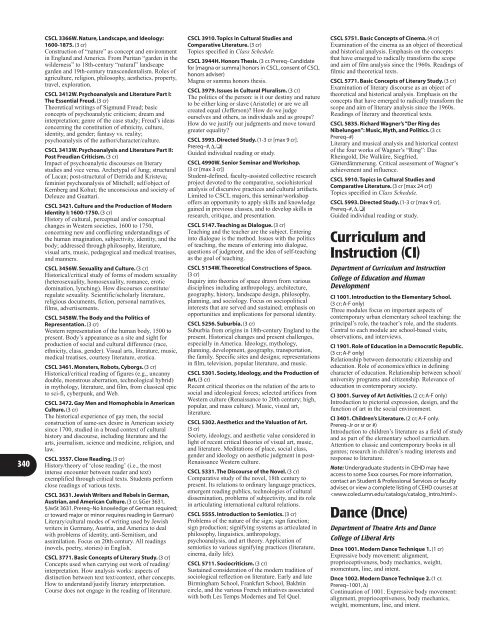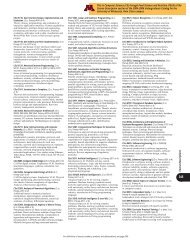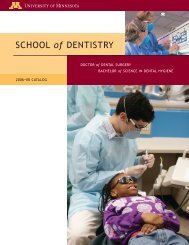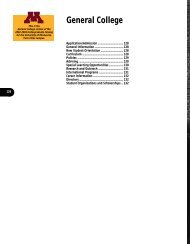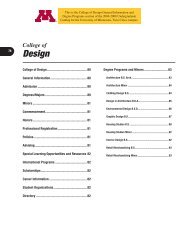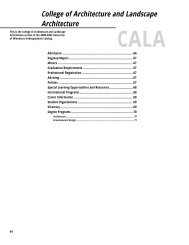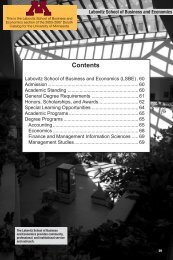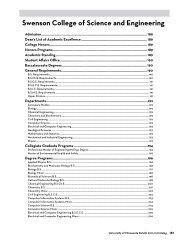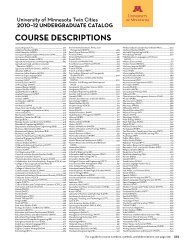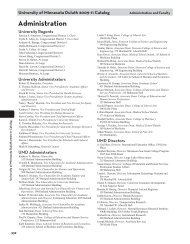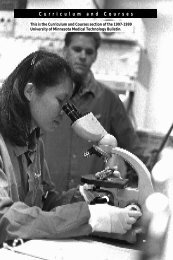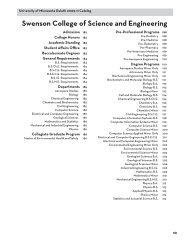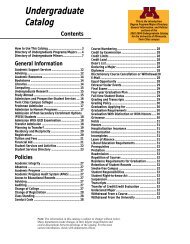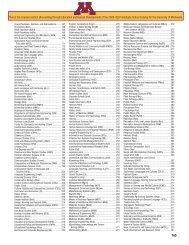CoursesâA through G and course numbers and symbols key
CoursesâA through G and course numbers and symbols key
CoursesâA through G and course numbers and symbols key
- No tags were found...
Create successful ePaper yourself
Turn your PDF publications into a flip-book with our unique Google optimized e-Paper software.
340CSCL 3366W. Nature, L<strong>and</strong>scape, <strong>and</strong> Ideology:1600-1875. (3 cr)Construction of “nature” as concept <strong>and</strong> environmentin Engl<strong>and</strong> <strong>and</strong> America. From Puritan “garden in thewilderness” to 18th-century “natural” l<strong>and</strong>scapegarden <strong>and</strong> 19th-century transcendentalism. Roles ofagriculture, religion, philosophy, aesthetics, property,travel, exploration.CSCL 3412W. Psychoanalysis <strong>and</strong> Literature Part I:The Essential Freud. (3 cr)Theoretical writings of Sigmund Freud; basicconcepts of psychoanalytic criticism; dream <strong>and</strong>interpretation; genre of the case study; Freud’s ideasconcerning the constitution of ethnicity, culture,identity, <strong>and</strong> gender; fantasy vs. reality;psychoanalysis of the author/character/culture.CSCL 3413W. Psychoanalysis <strong>and</strong> Literature Part II:Post Freudian Criticism. (3 cr)Impact of psychoanalytic dis<strong>course</strong>s on literarystudies <strong>and</strong> vice versa. Archetypal of Jung; structuralof Lacan; post-structural of Derrida <strong>and</strong> Kristeva;feminist psychoanalysis of Mitchell; self/object ofKernberg <strong>and</strong> Kohut; the unconscious <strong>and</strong> society ofDeleuze <strong>and</strong> Guattari.CSCL 3421. Culture <strong>and</strong> the Production of ModernIdentity I: 1600-1750. (3 cr)History of cultural, perceptual <strong>and</strong>/or conceptualchanges in Western societies, 1600 to 1750,concerning new <strong>and</strong> conflicting underst<strong>and</strong>ings ofthe human imagination, subjectivity, identity, <strong>and</strong> thebody; addressed <strong>through</strong> philosophy, literature,visual arts, music, pedagogical <strong>and</strong> medical treatises,<strong>and</strong> manners.CSCL 3456W. Sexuality <strong>and</strong> Culture. (3 cr)Historical/critical study of forms of modern sexuality(heterosexuality, homosexuality, romance, eroticdomination, lynching). How dis<strong>course</strong>s constitute/regulate sexuality. Scientific/scholarly literature,religious documents, fiction, personal narratives,films, advertisements.CSCL 3458W. The Body <strong>and</strong> the Politics ofRepresentation. (3 cr)Western representation of the human body, 1500 topresent. Body’s appearance as a site <strong>and</strong> sight forproduction of social <strong>and</strong> cultural difference (race,ethnicity, class, gender). Visual arts, literature, music,medical treatises, courtesy literature, erotica.CSCL 3461. Monsters, Robots, Cyborgs. (3 cr)Historical/critical reading of figures (e.g., uncannydouble, monstrous aberration, technological hybrid)in mythology, literature, <strong>and</strong> film, from classical epicto sci-fi, cyberpunk, <strong>and</strong> Web.CSCL 3472. Gay Men <strong>and</strong> Homophobia in AmericanCulture. (3 cr)The historical experience of gay men, the socialconstruction of same-sex desire in American societysince 1700, studied in a broad context of culturalhistory <strong>and</strong> dis<strong>course</strong>, including literature <strong>and</strong> thearts, journalism, science <strong>and</strong> medicine, religion, <strong>and</strong>law.CSCL 3557. Close Reading. (3 cr)History/theory of ‘close reading’ (i.e., the mostintense encounter between reader <strong>and</strong> text)exemplified <strong>through</strong> critical texts. Students performclose readings of various texts.CSCL 3631. Jewish Writers <strong>and</strong> Rebels in German,Austrian, <strong>and</strong> American Culture. (3 cr. §Ger 3631,§JwSt 3631. Prereq–No knowledge of German required;cr toward major or minor requires reading in German)Literary/cultural modes of writing used by Jewishwriters in Germany, Austria, <strong>and</strong> America to dealwith problems of identity, anti-Semitism, <strong>and</strong>assimilation. Focus on 20th century. All readings(novels, poetry, stories) in English.CSCL 3771. Basic Concepts of Literary Study. (3 cr)Concepts used when carrying out work of reading/interpretation. How analysis works: aspects ofdistinction between text text/context, other concepts.How to underst<strong>and</strong>/justify literary interpretation.Course does not engage in the reading of literature.CSCL 3910. Topics in Cultural Studies <strong>and</strong>Comparative Literature. (3 cr)Topics specified in Class Schedule.CSCL 3944H. Honors Thesis. (3 cr. Prereq–C<strong>and</strong>idatefor [magna or summa] honors in CSCL, consent of CSCLhonors adviser)Magna or summa honors thesis.CSCL 3979. Issues in Cultural Pluralism. (3 cr)The politics of the person: is it our destiny <strong>and</strong> natureto be either king or slave (Aristotle) or are we allcreated equal (Jefferson)? How do we judgeourselves <strong>and</strong> others, as individuals <strong>and</strong> as groups?How do we justify our judgments <strong>and</strong> move towardgreater equality?CSCL 3993. Directed Study. (1-3 cr [max 9 cr].Prereq–#, ∆, ❏)Guided individual reading or study.CSCL 4990W. Senior Seminar <strong>and</strong> Workshop.(3 cr [max 3 cr])Student-defined, faculty-assisted collective researchproject devoted to the comparative, sociohistoricalanalysis of discursive practices <strong>and</strong> cultural artifacts.Limited to CSCL majors, this seminar/workshopoffers an opportunity to apply skills <strong>and</strong> knowledgegained in previous classes, <strong>and</strong> to develop skills inresearch, critique, <strong>and</strong> presentation.CSCL 5147. Teaching as Dialogue. (3 cr)Teaching <strong>and</strong> the teacher are the subject. Enteringinto dialogue is the method. Issues with the politicsof teaching, the means of entering into dialogue,questions of judgment, <strong>and</strong> the idea of self-teachingas the goal of teaching.CSCL 5154W. Theoretical Constructions of Space.(3 cr)Inquiry into theories of space drawn from variousdisciplines including anthropology, architecture,geography, history, l<strong>and</strong>scape design, philosophy,planning, <strong>and</strong> sociology. Focus on sociopoliticalinterests that are served <strong>and</strong> sustained; emphasis onopportunities <strong>and</strong> implications for personal identity.CSCL 5256. Suburbia. (3 cr)Suburbia from origins in 18th-century Engl<strong>and</strong> to thepresent. Historical changes <strong>and</strong> present challenges,especially in America. Ideology, mythology,planning, development, geography, transportation,the family. Specific sites <strong>and</strong> designs; representationsin film, television, popular literature, <strong>and</strong> music.CSCL 5301. Society, Ideology, <strong>and</strong> the Production ofArt. (3 cr)Recent critical theories on the relation of the arts tosocial <strong>and</strong> ideological forces; selected artifices fromWestern culture (Renaissance to 20th century; high,popular, <strong>and</strong> mass culture). Music, visual art,literature.CSCL 5302. Aesthetics <strong>and</strong> the Valuation of Art.(3 cr)Society, ideology, <strong>and</strong> aesthetic value considered inlight of recent critical theories of visual art, music,<strong>and</strong> literature. Meditations of place, social class,gender <strong>and</strong> ideology on aesthetic judgment in post-Renaissance Western culture.CSCL 5331. The Dis<strong>course</strong> of the Novel. (3 cr)Comparative study of the novel, 18th century topresent. Its relations to ordinary language practices,emergent reading publics, technologies of culturaldissemination, problems of subjectivity, <strong>and</strong> its rolein articulating international cultural relations.CSCL 5555. Introduction to Semiotics. (3 cr)Problems of the nature of the sign; sign function;sign production; signifying systems as articulated inphilosophy, linguistics, anthropology,psychoanalysis, <strong>and</strong> art theory. Application ofsemiotics to various signifying practices (literature,cinema, daily life).CSCL 5711. Sociocriticism. (3 cr)Sustained consideration of the modern tradition ofsociological reflection on literature. Early <strong>and</strong> lateBirmingham School, Frankfurt School, Bakhtincircle, <strong>and</strong> the various French initiatives associatedwith both Les Temps Modernes <strong>and</strong> Tel Quel.CSCL 5751. Basic Concepts of Cinema. (4 cr)Examination of the cinema as an object of theoretical<strong>and</strong> historical analysis. Emphasis on the conceptsthat have emerged to radically transform the scope<strong>and</strong> aim of film analysis since the 1960s. Readings offilmic <strong>and</strong> theoretical texts.CSCL 5771. Basic Concepts of Literary Study. (3 cr)Examination of literary dis<strong>course</strong> as an object oftheoretical <strong>and</strong> historical analysis. Emphasis on theconcepts that have emerged to radically transform thescope <strong>and</strong> aim of literary analysis since the 1960s.Readings of literary <strong>and</strong> theoretical texts.CSCL 5835. Richard Wagner’s “Der Ring desNibelungen”: Music, Myth, <strong>and</strong> Politics. (3 cr.Prereq–#)Literary <strong>and</strong> musical analysis <strong>and</strong> historical contextof the four works of Wagner’s “Ring”: DasRheingold, Die Walküre, Siegfried,Götterdämmerung. Critical assessment of Wagner’sachievement <strong>and</strong> influence.CSCL 5910. Topics in Cultural Studies <strong>and</strong>Comparative Literature. (3 cr [max 24 cr])Topics specified in Class Schedule.CSCL 5993. Directed Study. (1-3 cr [max 9 cr].Prereq–#, ∆, ❏)Guided individual reading or study.Curriculum <strong>and</strong>Instruction (CI)Department of Curriculum <strong>and</strong> InstructionCollege of Education <strong>and</strong> HumanDevelopmentCI 1001. Introduction to the Elementary School.(3 cr; A-F only)Three modules focus on important aspects ofcontemporary urban elementary school teaching: theprincipal’s role, the teacher’s role, <strong>and</strong> the students.Central to each module are school-based visits,observations, <strong>and</strong> interviews.CI 1901. Role of Education in a Democratic Republic.(3 cr; A-F only)Relationship between democratic citizenship <strong>and</strong>education. Role of economics/ethics in definingcharacter of education. Relationship between school/university programs <strong>and</strong> citizenship. Relevance ofeducation in contemporary society.CI 3001. Survey of Art Activities. (2 cr; A-F only)Introduction to pictorial expression, design, <strong>and</strong> thefunction of art in the social environment.CI 3401. Children’s Literature. (2 cr; A-F only.Prereq–Jr or sr or #)Introduction to children’s literature as a field of study<strong>and</strong> as part of the elementary school curriculum.Attention to classic <strong>and</strong> contemporary books in allgenres; research in children’s reading interests <strong>and</strong>response to literature.Note: Undergraduate students in CEHD may haveaccess to some 5xxx <strong>course</strong>s. For more information,contact an Student & Professional Services or facultyadviser, or view a complete listing of CEHD <strong>course</strong>s at.Dance (Dnce)Department of Theatre Arts <strong>and</strong> DanceCollege of Liberal ArtsDnce 1001. Modern Dance Technique 1. (1 cr)Expressive body movement: alignment,proprioceptiveness, body mechanics, weight,momentum, line, <strong>and</strong> intent.Dnce 1002. Modern Dance Technique 2. (1 cr.Prereq–1001, ∆)Continuation of 1001. Expressive body movement:alignment, proprioceptiveness, body mechanics,weight, momentum, line, <strong>and</strong> intent.


